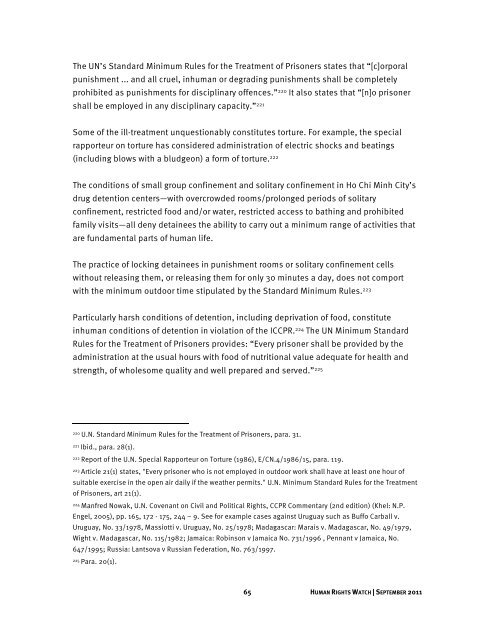The Rehab Archipelago - Human Rights Watch
The Rehab Archipelago - Human Rights Watch
The Rehab Archipelago - Human Rights Watch
You also want an ePaper? Increase the reach of your titles
YUMPU automatically turns print PDFs into web optimized ePapers that Google loves.
<strong>The</strong> UN’s Standard Minimum Rules for the Treatment of Prisoners states that “[c]orporal<br />
punishment ... and all cruel, inhuman or degrading punishments shall be completely<br />
prohibited as punishments for disciplinary offences.” 220 It also states that “[n]o prisoner<br />
shall be employed in any disciplinary capacity.” 221<br />
Some of the ill-treatment unquestionably constitutes torture. For example, the special<br />
rapporteur on torture has considered administration of electric shocks and beatings<br />
(including blows with a bludgeon) a form of torture. 222<br />
<strong>The</strong> conditions of small group confinement and solitary confinement in Ho Chi Minh City’s<br />
drug detention centers—with overcrowded rooms/prolonged periods of solitary<br />
confinement, restricted food and/or water, restricted access to bathing and prohibited<br />
family visits—all deny detainees the ability to carry out a minimum range of activities that<br />
are fundamental parts of human life.<br />
<strong>The</strong> practice of locking detainees in punishment rooms or solitary confinement cells<br />
without releasing them, or releasing them for only 30 minutes a day, does not comport<br />
with the minimum outdoor time stipulated by the Standard Minimum Rules. 223<br />
Particularly harsh conditions of detention, including deprivation of food, constitute<br />
inhuman conditions of detention in violation of the ICCPR. 224 <strong>The</strong> UN Minimum Standard<br />
Rules for the Treatment of Prisoners provides: “Every prisoner shall be provided by the<br />
administration at the usual hours with food of nutritional value adequate for health and<br />
strength, of wholesome quality and well prepared and served.” 225<br />
220 U.N. Standard Minimum Rules for the Treatment of Prisoners, para. 31.<br />
221 Ibid., para. 28(1).<br />
222 Report of the U.N. Special Rapporteur on Torture (1986), E/CN.4/1986/15, para. 119.<br />
223 Article 21(1) states, "Every prisoner who is not employed in outdoor work shall have at least one hour of<br />
suitable exercise in the open air daily if the weather permits." U.N. Minimum Standard Rules for the Treatment<br />
of Prisoners, art 21(1).<br />
224 Manfred Nowak, U.N. Covenant on Civil and Political <strong>Rights</strong>, CCPR Commentary (2nd edition) (Khel: N.P.<br />
Engel, 2005), pp. 165, 172 - 175, 244 – 9. See for example cases against Uruguay such as Buffo Carball v.<br />
Uruguay, No. 33/1978, Massiotti v. Uruguay, No. 25/1978; Madagascar: Marais v. Madagascar, No. 49/1979,<br />
Wight v. Madagascar, No. 115/1982; Jamaica: Robinson v Jamaica No. 731/1996 , Pennant v Jamaica, No.<br />
647/1995; Russia: Lantsova v Russian Federation, No. 763/1997.<br />
225 Para. 20(1).<br />
65 HUMAN RIGHTS WATCH | SEPTEMBER 2011

















